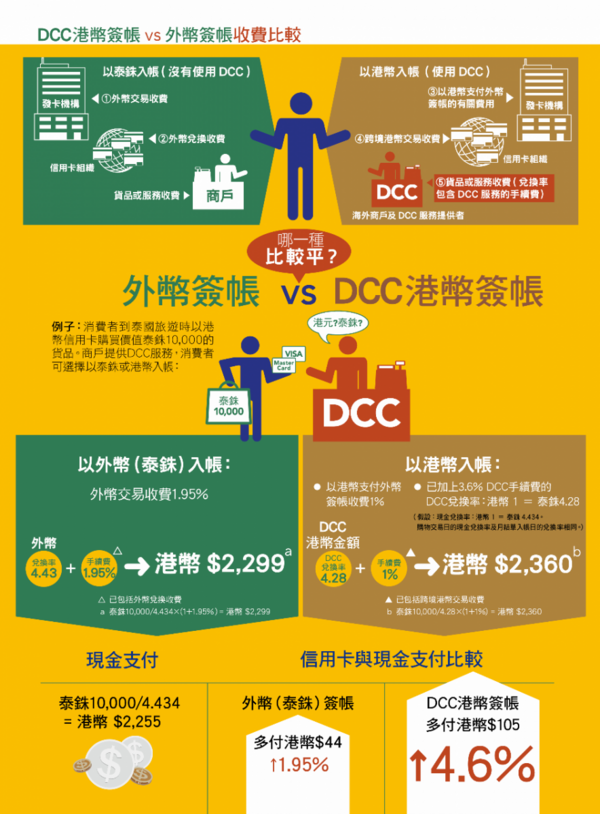When spending with credit cards abroad, consumers should be wary of fees and charges, one way or the other, regardless paying in the trader’s local currency or Hong Kong Dollar (HKD). Although some credit card issuers advertise “fee waiver” to promote usage, the truth is only part of the transaction fees are waived and consumers may easily be misled.
The Consumer Council calls for the authority to review and regulate wordings on advertising materials to avoid misleading consumers, and sufficient channels should also be put in place to disseminate information on fees and charges to consumers. Card issuers should also establish user-friendly websites for consumers to inquire on the fees and conversion rates on overseas spending to enable them to work out the most economical payment methods at anytime and anywhere.
Consumers should note that fees on overseas spending are imposed primarily by card issuers and credit card associations. Besides, depending on which currency a consumer has chosen, transaction fee for “Dynamic Currency Conversion” (DCC) might also be imposed.
Some card issuers use “Fee-waiver for Overseas Spending” for credit card promotion. In fact, only the card issuer does not charge for transaction fee. Consumers may still be required to pay transaction fees imposed by other service providers and the total amount of these fees could add up to 4 - 6% of the spending.
The Consumer Council surveyed 21 local card issuers about fees on overseas transactions and a large disparity was found from bank to bank. If a consumer chooses to pay by the trader’s local currency, some card issuers may waive transaction fees. However, the highest one incurs transaction fee at 2.45% of each spending. For a spending at $10,000 transaction fee could be as high as $245.
The Council’s survey also found that only a handful of the surveyed would provide information on transaction fees and details as general information in cardholders’ contract or bank statement. Consumers could only look up details on the issuers’ website or approach branch offices or customer hotline for details.
If the transaction was effected in foreign currency, consumers are unable to know the exact amount to be debited at the point of sale because the exchange rate is normally selected by the credit card associations on the date of clearance from the wholesale market rates or the government-mandated rate. Consumers would only come to know the final amount charged in HKD upon receiving the statement or through other channels for transaction enquiries. Throughout the entire experience of using credit card abroad, consumers are largely passive as important information such as exchange rate and transaction fees are unknown to them.
Consumers may also choose to pay in HKD when using their credit card abroad, which is called Dynamic Currency Conversion, a service provided by foreign merchants or currency conversion service providers. Currency conversion is provided instantly when a transaction happened.
The merit of DCC is consumers will know the exact debit amount at the point of sale. However, from the examples that the Council has come across, the currency conversion company impose a transaction fee of 3% or above, and some could even charge as high as 5%.
Take credit card claiming “fee waived for overseas spending” as an example, consumers who choose to pay by DCC do not have to pay transaction fee to the card issuer. However, both credit card association and DCC service provider impose fees at 1% and 3 - 5% respectively, which can add up to 4 - 6% of the spending amount.
For instance, if a consumer chooses to pay by DCC for an overseas spending, the credit card association might impose 1% as transaction fee while 3.6% might be imposed for currency conversion and the total adds up to 4.6%. Should the same purchase was made in foreign currency, only one transaction fee at 1.95% would be imposed by the card issuer. If the transaction amount is HK$1,000, an extra of $46 has to be paid when using DCC, which is more than a double when the same transaction is paid in the trader’s local currency which is around $19.5. The higher the spending amount, the more transaction fees consumers have to pay.
Unless the foreign currency fluctuates substantially in the short term, consumers are otherwise advised to spend in the trader’s local currency which usually results in less transaction fees.
In addition, when consumers use HKD credit card to pay overseas online shop, consumers might face the same predicament of choosing a payment in foreign currency or HKD. Consumers are advised to choose the currency of clearance of the online shop or alternatively, they should try out currency conversions for comparison in advance.
Consumers are advised of the following tips when paying by credit cards overseas or shopping on online shops:
- Do not take the words of “fee-free” easily. Scrutinize the advertisement to see if other charges are listed;
- Compare fees imposed by credit card issuers and identify the payment method with the most savings;
- Pay by the trader’s local currency when abroad or in online shops as far as possible to avoid additional DCC transaction fees;
- Before confirming a transaction, read and confirm carefully the receipt or information displayed on the credit card payment terminal, like the currency, spending amount, exchange rate and transaction fees, etc.
- Keep payment receipt and cross-check monthly statement later.
The Consumer Council reserves all its right (including copyright) in respect of CHOICE magazine and Online CHOICE (https://echoice.consumer.org.hk/).




